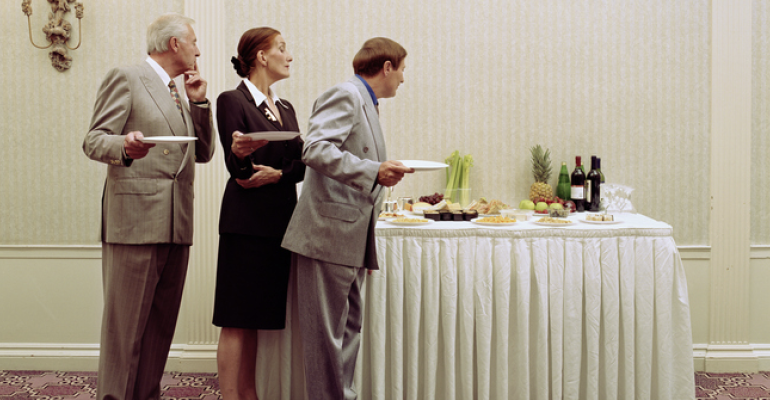For event planners at life-science firms, what has long been their most trying task is approaching the point of absurdity.
With inflation persistently driving up the cost of food and beverage at business events—hospitality-research firm STR finds that prices for group F&B at U.S. hotels are about 10 percent higher than they were just a year ago—any life-science meetings with healthcare professionals as attendees are bumping up against their compliance departments’ meal-cap limits worse than ever before.
While “the term ‘reasonable’ is vague in the [PhRMA] code” as it refers to HCP meals, “the issue is more about a company’s risk tolerance,” noted Andrew Hoag, MMP, HMCC, procurement category manager - commercial meetings and events for Biogen.
Not only that, “physicians from some countries are simply not going to be invited to advisory boards and investigator meetings because of the meal-cap restrictions” imposed by their own governments, said Jennifer Bechan, CMP-HC, HMCC, strategic account manager for Bishop-McCann. And for other life-science company events taking place outside the U.S., Hoag added that “we might have to start crossing countries off of our list of where we can go, given the meal-cap rules.”
What Planners Can Do
In a Pharma Forum 2024 session titled “Best Practices to Collaborate with the Compliance Team,” Hoag and Bechan were joined on stage by Kari Loeser, vice president and chief compliance officer for Cytokinetics, and Mike Ruocco, CEO of InnoVia Productions.
The four medical-event veterans agreed that although food and beverage is a central factor in attendees’ satisfaction with an event, other parts of a meeting can be built out in a way that shifts the focus away from F&B.
For instance, “I make sure the service experience in every area of the meeting is elevated,” Bechan noted. “Also, we’re using a lot of real-time polling and other interesting engagement activities because physicians love connecting with each other” about their clinical experiences related to the meeting content.
Ruocco added that “we always try to use great visuals, lighting, and other production elements, and we never use pipe and drape for booths or activations.”
Interestingly, the compliance officer on the panel, Loeser, offered a few ways to get the most from F&B spend. First, she reminded planners to watch what might get lumped in with meal costs. An example: “pre-paid service charges or gratuities and any audiovisual costs related to meal events do not count towards the meal cap, so make sure to break those out,” she said.
Another suggestion from Loeser: “Do heavy hors d’oeuvres rather than sit-down meals whenever you can.” In an earlier general session at Pharma Forum, one physician who participated in a panel discussion said that “it’s great to go outdoors for a reception once or twice rather than do only sit-down meals inside.”
Final Advice
Hoag emphasized that “it’s best to have a regular rapport with both your procurement and compliance teams. Don’t engage them only when you have a problem.” In addition, Loeser advised planners to “come to your compliance people not just with your problem, but with a few potential solutions. We will try to meet you halfway and make things work for everyone.”

Above: Jennifer Bechan, Kari Loeser, Andrew Hoag, and Mike Ruocco share a laugh during their panel discussion at Pharma Forum 2024.




